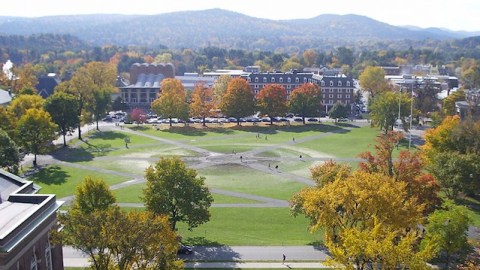Are College Students Too Liberal to Vote?

One way to win to elections is to keep the people who support your opponent from voting. That’s why Republicans in New Hampshire proposed new laws last week making it difficult for college students to vote.
Last year, a conservative group calling itself Latinos for Reform ran an ad suggesting that Latinos should express their satisfaction with both parties’ immigration policies by not voting at all. The group’s website still carries a message telling Latinos that if they don’t want to be taken for granted, they shouldn’t vote. Not voting, of course, is precisely the way to ensure that politicians do take you for granted. But since Latinos largely vote Democratic, protesting immigration policy by staying home on election day would have overwhelming benefited Republicans.
College students, of course, also largely vote Democratic. The Twenty-Sixth Amendment guarantees the right of Americans 18 and over to vote, but the proposed legislation would have let college students vote only if their parents had established permanent residency in the state. Most students would presumably still be able to vote in their state of origin, but the law would make it much more difficult for them to vote than it would be for other more conservative citizens. The proposed legislation was ostensibly part of an effort to crack down on voter fraud. But, as Greg Sargent points out, there is little evidence of such fraud, and for the most part anti-fraud measures just make it more difficult for liberal groups to vote. New Hampshire Speaker of the House William O’Brien made it clear that was part of the motivation for the New Hampshire bill when he told to a Tea Party group that students lack “life experience” and “just vote their feelings.” “Voting as a liberal,” he told them, “that’s what kids do.”
The New Hampshire bill failed, partly because O’Brien’s comments hit YouTube. Even if as a very general rule our judgment improves as we get older, younger people also have a perspective and legitimate interests that older people lack. And if we are going to treat college age citizens as adults—tax them as adults, try them as adults, and even to serve in the armed forces as adults—we should allow them the same say in our government as everyone else. Making it difficult for the young to vote is no different than making it difficult for the elderly to vote would be. The great virtue of democracy in a society like ours is it forces parties to appeal to voters of all types—to the young and to the old, to blacks and to whites, to gays and to evangelical Christians. Steve Benen is right when he says that if Republicans want to win elections, “they should field better candidates and adopt a more sensible policy agenda, not push schemes like voter-ID bills that depress minority, youth, and low-income voter turnout.”





